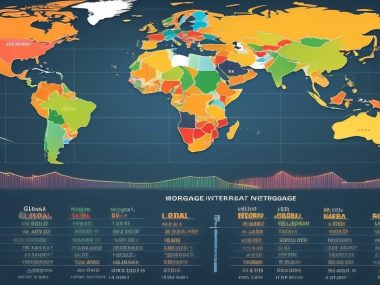Did you know that over 2.7 million Americans own properties abroad? Surprisingly, many wonder if they can secure a mortgage on foreign real estate. As an expert in the field, I’ll delve into this intriguing topic, shedding light on the possibilities and challenges of obtaining a mortgage for a property located outside your home country. Stay tuned to uncover the essential factors, requirements, and considerations involved in buying a house on a foreign property with money.
Key Takeaways
-
Consider Your Eligibility: Before pursuing a mortgage on a foreign property, assess your eligibility based on factors like income, credit history, and residency status.
-
Explore Financing Options: Research different financing options available for foreign property purchases, such as local lenders, international banks, or specialized mortgage providers.
-
Understand Deposit Requirements: Be aware of the deposit amount needed for a foreign property mortgage, which can vary based on the lender and the location of the property.
-
Be Aware of Costs and Risks: Understand the additional costs involved in securing a mortgage on a foreign property, including taxes, insurance, and potential currency fluctuations when buying a house; you need money.
-
Follow the Application Process: Familiarize yourself with the application process for a foreign property mortgage, including documentation requirements and timelines.
-
Preparation Is Key: Prepare thoroughly by organizing your financial documents, seeking professional advice, and conducting thorough research on the real estate practices in the country where you intend to buy a property.
Understanding Eligibility
Credit Score
Before applying for a mortgage on a foreign property, check your credit score to understand your financial standing. Make sure to pay bills on time to improve your credit score, enhancing your chances of approval. Lenders consider your credit score crucial in determining your mortgage eligibility.
Income Verification
To qualify for a mortgage, gather necessary income verification documents such as pay stubs and tax returns. Lenders require proof of stable income to ensure you can afford the loan. Expect thorough income verification checks during the mortgage application process.
Down Payment
Start saving for a down payment of at least 20% of the property’s value when seeking a mortgage. Keep in mind that overseas properties might have higher down payment requirements, impacting your financing options. Understand that the size of your down payment influences the terms of your mortgage agreement.
Property Type
Selecting the right property type is crucial; consider aspects like location and resale value. Different property types come with varying financing options, so it’s essential to understand how each one affects your mortgage terms.
Financing Options
Local Bank
When considering financing options for a foreign property, start by exploring local banks with international services. They can assist in arranging an overseas mortgage, leveraging their experience in the desired country. This can simplify the process and provide a familiar financial institution to work with.
Overseas Lender
Another option is to seek developer financing from an overseas lender. While this may come with slightly higher interest rates, it can be beneficial to work with lenders well-versed in local laws and regulations. Understanding these nuances can help streamline the borrowing process.
Home Equity
For those looking to invest in a foreign property, tapping into home equity could be a viable solution. By releasing equity from your current home, you can fund your overseas purchase. However, it’s crucial to understand the implications of using home equity and consider refinancing as an alternative method of financing.
Personal Savings
Using personal savings is another avenue to acquire a property abroad. Paying in cash offers benefits such as quicker transactions and potentially negotiating better deals. However, it’s essential to exercise caution when using personal savings for off-plan purchases.
Types of Mortgages
Fixed Rate
Consider a fixed-rate mortgage for predictable payments. Compare different fixed-rate options for foreign properties to find the best fit. Understand how fixed rates shield you from interest rate fluctuations, providing stability in payments.
Variable Rate
Explore variable-rate mortgages for flexibility in payment structures. Be prepared for potential interest rate changes with a variable rate option. Weigh the risks and benefits of variable rates when considering financing for your overseas property investment.
Interest Only
Understand the concept of interest-only mortgages before committing. Evaluate if an interest-only mortgage aligns with your short-term investment goals abroad. Be cautious about the risks associated with interest-only payments, ensuring you have a solid repayment plan.
When delving into mortgages for foreign properties, it’s crucial to assess your financial capabilities and risk tolerance. Researching various mortgage types can help you make an informed decision that suits your specific needs and long-term goals.
Deposit Requirements
Minimum Amount
Understanding the minimum amount needed for a mortgage is crucial. It typically ranges from 20% to 40% of the property’s value. This amount significantly impacts how much you can borrow. To increase your borrowing capacity, saving more than the minimum requirement is advisable.
Meeting the minimum amount requirements for overseas mortgages is essential. Some lenders may have stricter criteria for foreign property purchases. By having a clear understanding of the minimum deposit needed, you can plan your finances better.
Country Variations
Researching deposit requirements specific to the country where you intend to buy property is vital. Different countries have varying regulations regarding mortgage deposits. For example, some countries may require higher deposits for non-residents compared to residents.
Understanding the country-specific variations in property financing is key to a successful purchase abroad. In some regions, foreigners might face more stringent deposit rules or additional taxes. Being aware of these variations helps you make informed decisions and avoid unexpected financial challenges.
Real Estate Practices
Legal Differences
When buying a property in a foreign country, it’s crucial to understand the legal differences that may exist. These variations can significantly impact your ability to secure a mortgage on a foreign property. Seeking guidance from a real estate attorney is advisable to navigate through the complex web of foreign property laws effectively.
In some countries, the legal framework for property transactions may differ greatly from what you are accustomed to in your home country. These differences can influence how smoothly or challenging the process of obtaining a mortgage on a foreign property can be. Therefore, being aware of these legal disparities is essential for a successful transaction abroad.
Considering the nuances of property rights in different countries is paramount when purchasing real estate overseas. Understanding these rights and their implications can help you make informed decisions about acquiring a mortgage on a foreign property. It’s wise to seek expert advice from local professionals who are well-versed in the intricacies of property rights in the target market.
Property Rights
When exploring opportunities to purchase real estate abroad, understanding the transaction process is key. Familiarize yourself with the steps involved in buying property overseas, including legal requirements, documentation, and potential hurdles that may arise along the way. Being well-prepared for these differences can streamline your journey towards securing a mortgage on an international property.
Costs and Risks
Additional Fees
When considering a mortgage on a foreign property, be aware of additional fees beyond the loan amount. These can include legal fees, valuation fees, and insurance costs. Understanding these expenses is crucial for accurate budgeting.
Factor in how additional fees can significantly impact your overall property purchase costs. These extra expenses can vary depending on the country and specific mortgage terms. Researching and planning for these costs upfront is essential.
In budgeting for an overseas property purchase, it’s important to consider the impact of exchange rates. Fluctuations in currency values can affect your mortgage payments significantly. Being mindful of these changes can help you prepare financially for any potential variations.
Exchange Rate Impact
Exchange rate risks are a crucial consideration when dealing with foreign mortgages. Understanding how currency fluctuations can influence your monthly payments is vital for financial planning. Monitoring exchange rates regularly can help you anticipate any changes.
Being prepared for exchange rate risks involves staying informed about global economic trends that may affect currencies. It’s advisable to consult with financial experts to develop strategies to mitigate these risks effectively.
Legal Risks
Before proceeding with a mortgage on a foreign property, it’s essential to evaluate potential legal risks associated with purchasing real estate abroad. Legal considerations such as property rights and ownership laws vary from country to country.
Understanding how legal risks can impact your property ownership is critical for making informed decisions. Seeking legal advice from professionals specializing in international real estate transactions can provide valuable insights and guidance.
Application Process
Documentation Needed
Gather essential paperwork for your mortgage application, including income statements and identification documents. Understand the specific documents required for purchasing property abroad. Stay organized and ensure you have all necessary documentation ready for submission.
Approval Timeline
Know the timeline for your mortgage approval process to set realistic expectations. Various factors, such as credit history and property evaluation, can impact the approval timeline. Be prepared for potential delays that may arise during the approval process to avoid unnecessary stress.
Legal Considerations
Take into account the legal aspects involved in buying property in a foreign country. Legal considerations can significantly influence your property purchase journey, so it’s crucial to be well-informed. Address any legal concerns promptly and seek professional advice if needed to navigate through potential challenges smoothly.
Preparation Tips
Research Markets
When considering buying property in a foreign country, it’s crucial to research the local property markets thoroughly. Understand market trends to make informed decisions. Working with local experts can provide valuable insights into the market dynamics.
Financial Planning
Creating a detailed financial plan is essential before investing in overseas property. Factor in budgeting, financing options, and your long-term investment goals. Proactive financial management is key to successful property purchases abroad.
Legal Advice
Before finalizing any property purchase abroad, seek legal advice from professionals well-versed in international real estate transactions. Legal guidance is crucial for ensuring a smooth and secure buying process. Consulting legal experts can help navigate complex legal requirements effectively.
In my experience, researching the local property market extensively helped me make a well-informed decision when purchasing a house overseas. Creating a detailed financial plan early on allowed me to budget effectively and secure suitable financing options for my foreign property investment.
Final Remarks
I’ve covered the essential aspects of securing a mortgage on a foreign property, from eligibility requirements to deposit considerations and application processes. Understanding the financing options and real estate practices is crucial in navigating this complex process. Remember, preparation is key to a successful mortgage application.
If you’re considering investing in property abroad, ensure you research extensively, seek professional advice, and understand all costs involved. Take the time to prepare your financial documents and choose the right type of mortgage that suits your needs. With careful planning and attention to detail, you can make your dream of owning a foreign property a reality.






